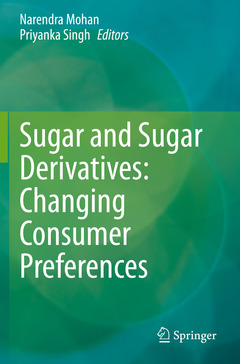Description
Sugar and Sugar Derivatives: Changing Consumer Preferences, 1st ed. 2020
Language: English
Subjects for Sugar and Sugar Derivatives: Changing Consumer Preferences:
Publication date: 12-2021
307 p. · 15.5x23.5 cm · Paperback
Publication date: 12-2020
307 p. · 15.5x23.5 cm · Hardback
Description
/li>Contents
/li>Biography
/li>Comment
/li>
Sugarcane enjoys a prominent position among agro-industrial crops and is commercially grown in 115 tropical and subtropical countries around the world. However, fluctuations in sugar prices have forced the sugarcane industry worldwide to broaden its revenue base by moving from single-commodity manufacturing to a range of value-added products. Utilizing the by-products in an innovative manner to create value-added products is the new course of action for sugar-producing countries.
For many years sugarcane was regarded as a single-product crop, i.e., only useful for producing sugar. Its actual potential is now increasingly being recognised by the industry and there is a growing trend toward the manufacturing of allied products from sugarcane. Therefore, the focus is now on the establishment of sugar-agro-industry complexes, processing not just sugar but a range of other products.This book provides a comprehensive overview of sugarcane not only as asource of sweetening agents but also for many other uses, including as a source of bio-energy. It also explores the trend of sugar consumption and suggests practices to curb the consumption of sugar products in order to tackle obesity and reduce public health costs. The book underscores the need to diversify sugarcane and highlights means of doing so, while also addressing various innovations and technologies being developed in connection with sugar, sugar derivatives, and sugar industry by-products for sustainable utilization in the sugar-agro industry. Accordingly, it offers a valuable resource for professionals and R&D units in the sugar industry, and for students of agronomy and related fields.
Prof. Narendra Mohan, after completing his post graduate studies in sugar technology, was awarded a Fellowship by the National Sugar Institute. He has a long and distinguished career in the sugar industry. As Director of the National Sugar Institute in Kanpur, he has made exemplary contributions to achieving a radical change in the Institute’s academic, research and consultancy activities, and making its presence felt globally. Besides being an excellent, popular and inspiring teacher, Prof Mohan has been a research worker par excellence who has published more than 100 papers in various international and national journals. He has also published two books on sugar production processes. His passion for innovative work to convert “waste to resources” has resulted in the development of many cost-effective and environment friendly technologies, e.g. the production of bio-surfactant from bagasse, production of bio-CNG from press mud and other agricultural waste, and production of sulphur-free sugar. He is the Chairman of the Sectional Committee of the Bureau of Indian Standards, which formulates quality standards for sugar and sugar derivatives. His contributions to the sugar industry have been acknowledged internationally, for which he has received many prestigious awards.
Dr. Priyanka Singh, presently working as scientific officer, Sugar Chemistry division, UPCSR, Shahjahanpur, India, completed her PhD in 2000. She was awarded a postdoctoral fellowship by the Department of Science &Technology, New Delhi, India in 2006 and 2010, and received an Award of Excellence from Sinai University, Al Arish, Egypt in 2008 and Young Sugarcane Scientist Award from Bhartiya Sugar in 2018. She has 19 years of research experience with a specialization in organophosphorus chemistry and in the area of cane quality/post–harvest management of sugar losses. She is currently working on the selection of best sugarcane varieties for the commercial production of jag




